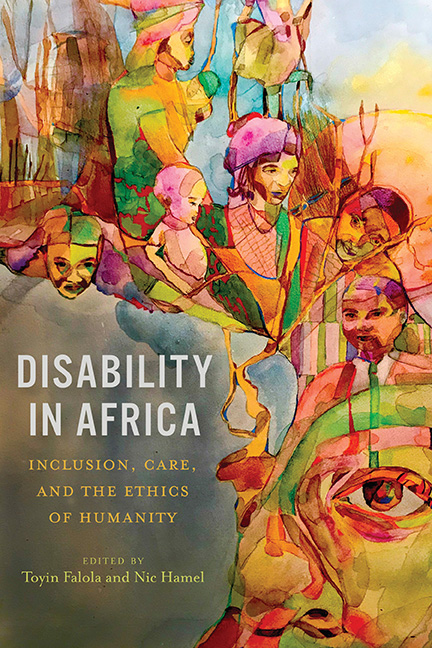Book contents
- Frontmatter
- Dedication
- Contents
- Part One Introducing the Field
- Part Two Theorizing Disability in Africa
- Part Three Representation and Cultural Expressions
- Part Four Education, Community, and Caregiving
- Part Five Activism and Barriers to Inclusion
- Conclusion: A Research Agenda for African Disability Studies
- Selected Bibliography
- Notes on Contributors
- Index
11 - Addressing Poverty and Inequality in Sub-Saharan Africa: Fostering Inclusive Education of Children with Disabilities
Published online by Cambridge University Press: 17 June 2021
- Frontmatter
- Dedication
- Contents
- Part One Introducing the Field
- Part Two Theorizing Disability in Africa
- Part Three Representation and Cultural Expressions
- Part Four Education, Community, and Caregiving
- Part Five Activism and Barriers to Inclusion
- Conclusion: A Research Agenda for African Disability Studies
- Selected Bibliography
- Notes on Contributors
- Index
Summary
Introduction
Education is essential to acquire a good job, a high income, social status, and a better life in general. For persons with disabilities, education is a vehicle for improving the quality of life and addressing the “disabilization” of poverty or ensuring that disability does not lead to penury. In this respect, broadening access of learners with disabilities to education would increase their chances of improving their standard of living. In other words, education is the equalizing factor needed to address poverty and inequality. It is one of the best weapons to combat poverty and inequality, as it empowers the beneficiaries of education to access other human rights needed to improve their well-being.
Yet, historically, children with disabilities, especially in Africa, do not have access to education. They are simply considered “uneducable.” To remedy the problem, international communities have adopted various international legislations such as the Standards Rules on the Equalisation of Opportunity for Person With Disabilities (adopted in 1993); the Salamanca statement and Framework for Action on Special Needs Education (adopted in 1994); the Education For All Flagship on Education and Disability (adopted in 2001); and (the only binding instrument) the CRPD, adopted in 2006 and came into force in 2008) and its Optional Protocol (adopted in 2006 and came into force in 2008). These international standards urge states to ensure that learners with disabilities are included in the education system. Article 24 of the CRPD is unequivocal in providing learners with disabilities the right to an education. And it sets the global yardstick to measure inclusive education. In this respect, it compels state parties to move toward a full right to education in inclusive settings at all levels and to ensure learners with disabilities access to education as well as the chance to develop life and social development skills. It also compels states to provide teacher training and ensure that children with disabilities have access to more than basic education.
However, the effective inclusion of children with disabilities remains elusive: these children remain at the margins and often become the face of poverty in their adult life. This chapter argues that to tackle poverty and inequality in sub-Saharan Africa, learners with disabilities must be included in the education system.
- Type
- Chapter
- Information
- Disability in AfricaInclusion, Care, and the Ethics of Humanity, pp. 241 - 254Publisher: Boydell & BrewerPrint publication year: 2021



